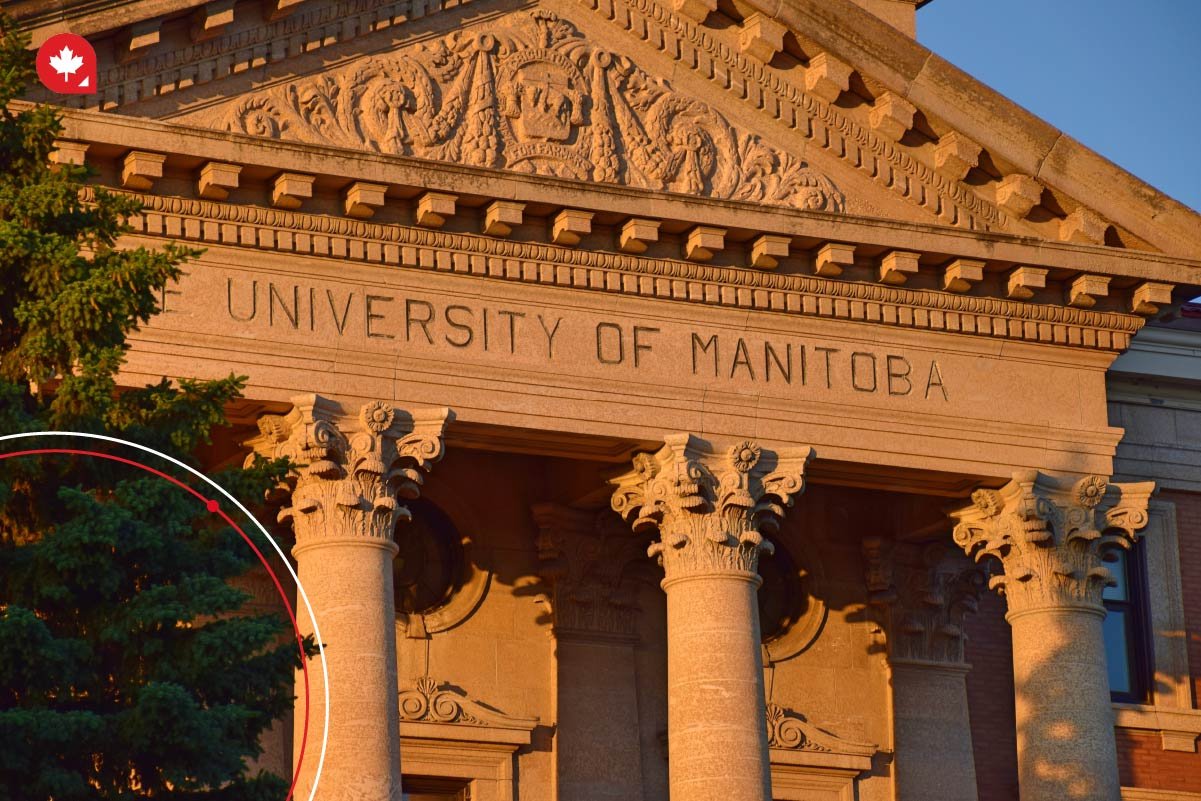Known for its exceptional academic institutions, Manitoba offers various programs across various disciplines for international students who want to study in Manitoba. This ensures that students can pursue their academic passions and career goals. Beyond academics, Manitoba boasts a welcoming and inclusive atmosphere, with communities that embrace cultural diversity and provide a supportive environment for students from all backgrounds.
We look at the many opportunities to study in Manitoba for international students in Canada.
Education in Manitoba

Education in Manitoba, overseen by the Manitoba Department of Education and Advanced Learning, emphasizes accessibility for all residents. This focus is evident in its K-12 system, post-secondary options, and commitment to inclusivity. Kindergarten is optional but widely attended, and school becomes mandatory at age seven.
Post-secondary education boasts a network of universities, colleges, and technical training institutions. The University of Manitoba, for example, is a leading research institution with a global reputation. Manitoba's education system presents a compelling proposition. From its emphasis on affordability and quality to its commitment to diversity and inclusion, the province offers a well-rounded learning experience for students of all backgrounds.
Learn more about education in Manitoba.
Why Study in Manitoba?
For international students looking for an exceptional education abroad, Manitoba offers a compelling combination of academic excellence, affordability, and a welcoming environment. Here's a detailed look at the advantages of studying in Manitoba.
High-Quality Education in Manitoba
Manitoba boasts a well-respected education system with a strong emphasis on innovation and research. The province is home to a network of universities, colleges, and technical training institutions offering various programs across various disciplines.
Leading Universities
The University of Manitoba, positioned in the top 400 universities in Times Higher Education (THE) rankings, offers the province's largest and only research-intensive university and enjoys a global reputation for excellence in medicine, engineering, and agriculture. Other universities, like Brandon University and the University of Winnipeg, offer exceptional social sciences, humanities, and education programs.
Diverse Program Options
Manitoba's post-secondary institutions cater to various academic interests. Universities offer traditional undergraduate and graduate programs, while colleges and technical institutes provide specialized business, healthcare, and information technology training. This variety allows students to find programs that perfectly align with their career aspirations.
Focus on Research and Innovation
Manitoba's universities actively engage in groundbreaking research, fostering a stimulating learning environment. Students have opportunities to participate in research projects alongside professors, gaining valuable hands-on experience and contributing to cutting-edge advancements. Prominent educational research projects in Manitoba include:
- Manitoba Education Research Network (MERN),
- Manitoba First Nations Education Resource Centre Inc. (MFNERC),
- PATHS Equity for Children research program,
- Manitoba Research Alliance Project.
Affordable Education in Manitoba
Compared to other Canadian provinces, Manitoba offers a significant advantage: affordability. Here's how studying in Manitoba can be budget-friendly:
Lower Tuition Fees
Manitoba's universities and colleges generally have lower tuition fees compared to the national average. This is demonstrated below with figures from Universities Canada.
| Canadian Universities | Undergraduate Foreign Student Tuition Fees (CAD) | Graduate Foreign Student Tuition Fees (CAD) |
|---|---|---|
| University of Manitoba (Manitoba) | 24,112.46 - 27,485.45 | 17,709.91 - 17,709.91 |
| University of Lethbridge (Alberta) | 29,034.37 - 29,034.37 | 19,363.51 - 19,363.51 |
| Trinity Western University (British Columbia) | 30,336.37 - 30,336.37 | 27,392.68 - 61,326.90 |
| University of Guelph (Quebec) | 45,035.42 - 45,035.42 | 18,636.29 - 23,340.68 |
| Western University (Ontario) | 51,394.67 - 57,555.98 | 26,916.86 - 26,916.86 |
Learn more about the province's affordable tuition through the cost of living in Manitoba.
Scholarship Opportunities
The Manitoba government and educational institutions offer various scholarships and financial aid programs specifically targeted towards international students. These programs can significantly reduce educational costs and make studying in Manitoba even more attractive. The most prominent scholarship opportunities in Manitoba include:
- Alumni Entrance Scholarships,
- Irene Stratford Memorial Scholarship,
- Aecom Scholarships,
- Boeing Canada Technology Limited Scholarship,
- Centennial Entrance Scholarship,
- Doug Newton Memorial Scholarship, and
- University Women's Club of Winnipeg Millennium Scholarship.
Safe and Welcoming Environment in Manitoba
Manitoba is renowned for its friendly and welcoming atmosphere. International students can expect a safe and supportive environment where they can thrive.
Multicultural Community
Manitoba embraces diversity and boasts a vibrant multicultural population. This welcoming environment allows international students to connect with people from various backgrounds, fostering intercultural understanding and lifelong friendships.
Supportive Services
Universities and colleges in Manitoba offer dedicated support services for international students. These services assist with immigration procedures, finding accommodation, and adapting to life in Canada.
Low Crime Rates
Manitoba has consistently low crime rates which according to Statistics Canada, currently sit at 6.24, making it a safe place to live and study. This ensures international students feel secure and focus on their academic pursuits with little to no anxiety.
Work and Study in Manitoba
Manitoba allows international students to gain valuable work experience while pursuing their studies. Here's how:
Off-Campus Work Permits
International students with a valid study permit can apply for an off-campus work permit, allowing them to work part-time during semesters and full-time during breaks. This can help students offset educational expenses and gain valuable Canadian work experience.
Learn more about off-campus activities in Canada.
Cooperative Education Programs (Co-op)
Many Manitoba universities and colleges offer co-op programs integrating work experience into the curriculum. These programs allow students to gain practical skills in their chosen field while earning an income.
Learn more about how to work in Canada as a student.
Supportive Education System in Manitoba
Manitoba's education system prioritizes student success and provides a supportive environment to help students reach their full potential.
Small Class Sizes
Many educational institutions in Manitoba, particularly colleges and universities outside major cities, boast smaller class sizes, allowing for more personalized attention from professors and a more interactive learning experience.
Academic Support Services
Universities and colleges provide access to various academic support services, such as:
- Writing centers,
- Tutoring,
- Academic advising,
- Supplemental Workshops and Seminars,
- Language Support Services,
- Accessibility Services,
- Online Resources, and
- Peer Support Groups.
These resources ensure students have the tools and support they need to excel in.
Recreational Opportunities in Manitoba
Beyond academic excellence and affordability, Manitoba offers many recreational activities for students seeking an enriching and enjoyable educational experience.
Outdoor Adventures
Manitoba's diverse landscape boasts stunning scenery and unparalleled opportunities for outdoor enthusiasts. From the vastness of the prairies to the boreal forests and the unique arctic tundra, Manitoba offers a variety of breathtaking natural environments to explore. Students can hike through scenic trails, camp under starry skies, or kayak on pristine lakes.
Learn more about outdoor adventures in the province by visiting Manitoba’s National Parks.
Cultural Experiences
Manitoba's rich cultural heritage offers a vibrant tapestry for international students to explore. Winnipeg, the provincial capital, boasts a thriving arts scene with museums, galleries, theaters, and a renowned ballet company. Smaller communities also host cultural events and festivals throughout the year.
Learn more about the province’s culture through Manitoba’s demographics.
Urban Explorations
Major cities in Manitoba, like Winnipeg, offer a variety of urban attractions for students seeking a cosmopolitan experience.
Vibrant Nightlife
Winnipeg boasts a lively nightlife scene with bars, pubs, and nightclubs catering to diverse tastes. The city offers various restaurants and cafes featuring local and international cuisines, allowing students to explore different culinary experiences.
Shopping Districts
Winnipeg and Brandon have vibrant shopping districts with independent boutiques, major retailers, and art galleries, providing opportunities to explore fashion and local crafts.
Learn more about recreation in the province via the things to do in Manitoba.
How Can I Study in Manitoba

Manitoba, with its excellent education system, affordable living, and welcoming environment, attracts international students worldwide. Below is the step-by-step process you can follow to study in Manitoba:
Step 1: Research and Choose a Program
The first thing you must do is choose a study program you’re interested in Manitoba’s educational institutions.
Explore Your Options
Manitoba boasts diverse educational institutions, including universities, colleges, and technical training institutes. Researching these institutions and their programs is the first step. Use resources like the Manitoba government's International Education website and individual institutional websites to explore program offerings, admission requirements, and application deadlines. Leading educational institutions in Manitoba you can explore include:
- University of Manitoba,
- University of Winnipeg,
- Brandon University,
- Red River College,
- Université de Saint-Boniface,
- Canadian Mennonite University,
- University College of the North,
- Assiniboine Community College,
- Manitoba Institute of Trades and Technology, and
- Providence University College.
Consider Your Interests
Reflect on your academic interests, career aspirations, and preferred learning environment. Universities offer traditional undergraduate and graduate degrees, while colleges and technical institutes focus on specialized career training. Consider factors like program duration, course structure, and practical components like internships or co-op opportunities.
Contact Your Potential Institutions
Once you've identified potential programs, reach out to the admissions departments of the respective institutions. They can provide detailed information about the programs and application procedures and answer specific questions.
Step 2: Meet Admission Requirements
The following are the admission requirements you have to meet.
Academic Transcripts
You must submit official transcripts from all previously attended institutions, translated into English or French if necessary.
Learn how to send transcripts to World Education Services (WES) for verification.
Standardized Test Scores
Many programs, such as the Canadian English Language Proficiency Index Program (CELPIP) or International English Language Testing System (IELTS), require standardized test scores for English language proficiency. Some programs may require additional tests specific to your chosen field.
Learn how to prepare for your test with our Canadian IELTS preparation course.
Meet Program-Specific Requirements
Each program may have additional requirements beyond general admission criteria. These could include portfolios, letters of recommendation, or work experience in the relevant field.
Financial Support
You may need to demonstrate sufficient financial resources to cover your tuition and living expenses during your studies. This could involve providing bank statements or proof of scholarship funding.
Learn more about getting financed as an international student in Canada.
Step 3: Apply to Manitoba Educational Institutions
After confirming your ability to meet the admission requirements of Manitoba’s educational institutions, apply to each potential school, college, or university in the province.
Application Deadlines
Each educational institution sets its application deadlines. Submitting your application well before the deadline is crucial to ensure proper consideration. Generally, applications for fall and winter studies are available in June. Students should apply early to make sure they complete all deadlines.
Application Fees
There may be application fees associated with each program you apply to. These fees are non-refundable, so ensure you meet the program requirements before submitting your application.
Online Applications
Most institutions offer online application portals for international students. These portals allow you to upload required documents and track the progress of your application. The most prominent online application portals include the University of Winnipeg's elluciancrmrecruit.com and the University of Manitoba’s afmcstudentportal.ca.
Step 4: Obtain a Study Permit
Eligibility
Once you receive an acceptance letter from a Designated Learning Institution (DLI) in Manitoba, you can apply for a study permit from Immigration, Refugees and Citizenship Canada (IRCC).
Application Process
The IRCC website outlines the application process, and lists required documents, including your:
- Acceptance letter,
- Proof of financial support,
- Provincial Attestation Letter (PAL),
- Medical examination results and a
- Valid passport.
Processing Time
Processing times for a Canada study permit can vary, so applying well before your intended start date is important.
Learn more about how to get a Canada study permit.
Step 5: Arrange Accommodation and Finances
Accommodation Options
Manitoba offers diverse housing options, including student residences, apartments, and homestays. Researching these options and securing accommodation well in advance, especially during peak semesters, is advisable.
Learn more about accommodation for international students in Canada.
Financial Planning
Create a budget outlining your anticipated tuition, living costs, and travel expenses. Explore scholarship opportunities offered by the Manitoba government, educational institutions, and external organizations to help offset costs.
Open a Bank Account
Opening a bank account in Canada can simplify managing your finances during your studies. Many Canadian banks offer student accounts with benefits tailored to international students.
Learn how to set up your bank account in Canada.
Step 6: Prepare for Arrival
To prepare for your arrival in Canada, ensure that you perform the following tasks listed below:
- Pre-Departure Checklist: Complete any pre-departure tasks, such as immunizations required for entry into Canada,
- Travel Arrangements: Book your flights and secure any necessary travel insurance,
- Familiarize Yourself with Canada: Learn about Canadian culture, customs, and laws to ensure a smooth transition, and
- Connect with the Institution: Contact your institution's international student support services for information about arrival procedures, orientation programs, and airport pick-up options.
Learn more about what to do when you arrive in Canada.
How Can I Permanently Immigrate to Canada After Graduation?
Graduating from a Canadian institution can be a stepping stone towards permanent residency in Canada. Here are three main pathways to consider:
Post-Graduation Work Permit
If you have completed a program of study at a designated learning institution in Canada, you may be eligible for a Post-Graduation Work Permit (PGWP). This Canada work permit allows you to work in Canada for up to three years after graduation, providing valuable Canadian work experience that can enhance your eligibility for Canadian permanent residency.
Canadian Experience Class (CEC)
Designed for skilled workers with Canadian work experience. You'll need to create an Express Entry profile on the IRCC website. which assigns you a Comprehensive Ranking System (CRS) score based on factors like work experience, education, language skills, and age. A high CRS score increases your chances of receiving an Invitation to Apply (ITA) for permanent residence. You can use our CRS calculator to evaluate your CRS score.
Provincial Nominee Program
Managed by individual provinces, these programs target skilled workers who wish to settle in a specific province. Manitoba offers several Provincial Nominee Programs (PNPs) streams for international students, including the Manitoba International Education Stream, some specifically designed for international graduates. Requirements and application processes vary by province, so research Manitoba's PNP options.
Learn more about how to get Canadian permanent residency in Canada after graduation.
FAQs

Can I Delay Acceptance To Study in Manitoba?
Some institutions in Manitoba may allow students to delay their acceptance to a later intake. Still, checking with the specific institution and program regarding their deferral policies and procedures is essential.
What Are the Expected Living Costs For Students in Winnipeg?
The expected living costs for students in Winnipeg typically include accommodation, food, transportation, utilities, and miscellaneous expenses, which can amount to approximately 10,000 to 15,000 CAD per year, depending on individual lifestyle choices and preferences.
What is Manitoba Student Aid?
Manitoba Student Aid is a government-funded program that provides financial assistance to eligible Manitoba residents pursuing post-secondary education. It offers various forms of financial aid, including grants and loans, to help cover tuition fees, books, living expenses, and other educational costs for eligible students.




